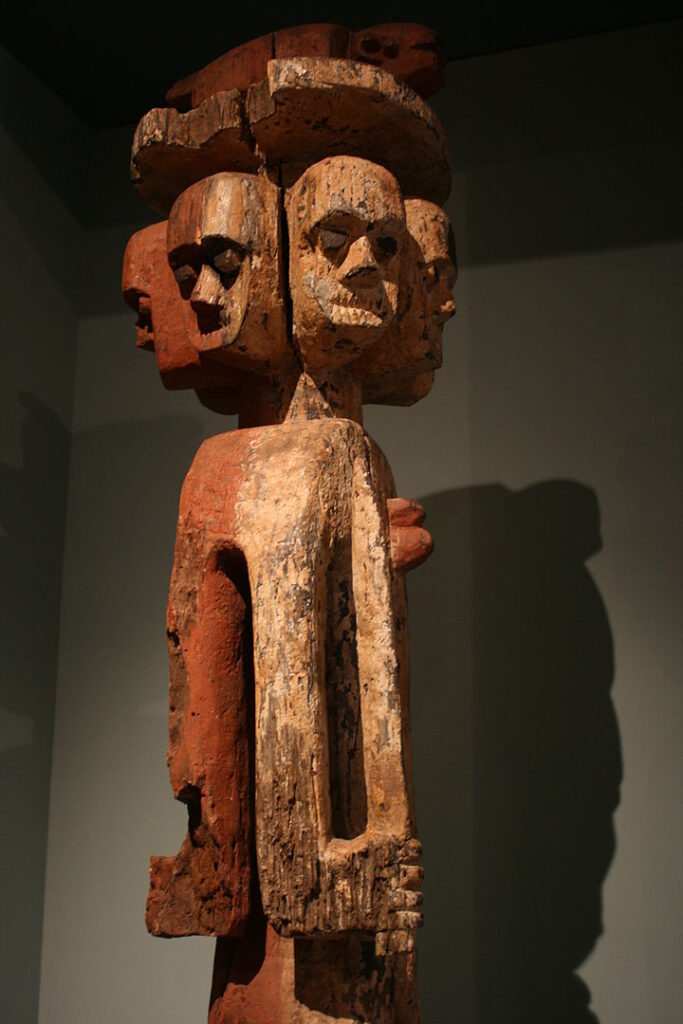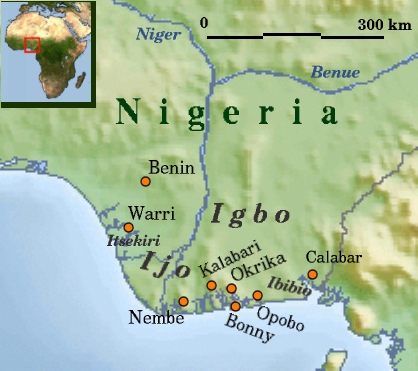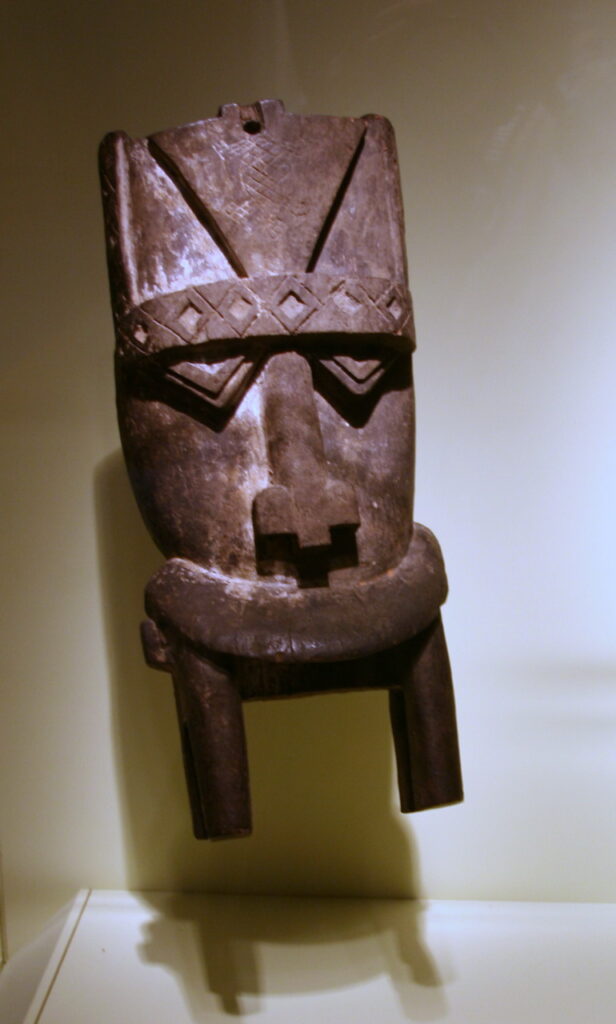Ijaw people (also known by the subgroups “Ijo” or “Izon”) are people in Niger Delta in Nigeria, Predominantly found in Bayelsa state, Delta State and Rivers State.They are also found in other Nigerian states like Ondo, Edo and Akwa Ibom. Many are found as migrant fishermen in camps as far west as Sierra Leone and as far east as Gabon. Population figures for the Ijaws vary greatly, 5 million. They have long lived in locations near many sea trade routes, and they were well connected to other areas by trade as early as the 15th century.
Language
The Ijaw speak nine closely related Niger–Congo languages, all of which belong to the Ijoid branch of the Niger–Congo tree. The primary division between the Ijo languages is that between Eastern Ijo and Western Ijo, the most important of the former group of languages being Izon, which is spoken by about five million people.

There are two prominent groupings of the Izon language. The first, termed either Western or Central Izon (Ijaw) consists of Western Ijaw speakers: Tuomo Clan, Egbema, Ekeremor, Sagbama (Mein), Bassan, Apoi, Arogbo, Boma (Bumo), Kabo (Kabuowei), Ogboin, Tarakiri, and Kolokuma-Opokuma. Nembe, Brass and Akassa (Akaha) dialects represent Southeast Ijo (Izon). Buseni and Okordia dialects are considered Inland Ijo.
The other major Ijaw linguistic group is Kalabari. Kalabari is considered an Eastern Ijaw language but the term “Eastern Ijaw” is not the normal nomenclature. Kalabari is the name of one of the Ijaw clans that reside on the eastern side of the Niger-Delta (Abonnema, Buguma, Bakana, Degema etc.) who form a major group in Rivers State, Other “Eastern” Ijaw clans are the Abua, Andoni, Okrika, Ibani (the natives of Bonny, Finima and Opobo), and Nkoroo. They are neighbours to the Kalabari people in present-day Rivers State, Nigeria.
Other related Ijaw subgroups which have distinct languages but very close kinship, cultural and territorial ties with the rest of the Ijaw are the Epie-Atissa, Engenni (also known as Ẹgẹnẹ), and Degema (also called Udekama or Udekaama). The Ogbia clan, as well as residents of Bukuma and Abuloma (Obulom).
It was discovered in the 1980s that a now extinct Berbice Creole Dutch, spoken in Guyana, is partly based on Ijo lexicon and grammar. Its nearest relative seems to be Eastern Ijo, most likely Kalabari.
Traditional occupations
The Ijaws were one of the first of Nigeria’s peoples to have contact with Westerners, and were active as go-betweens in the slave trade between visiting Europeans and the peoples of the interior, particularly in the era before the discovery of quinine, when West Africa was still known as the “White Man’s Graveyard” because of the endemic presence of malaria. Some of the kin-based trading lineages that arose among the Ijaws developed into substantial corporations which were known as “houses”; each house had an elected leader as well as a fleet of war canoes for use in protecting trade and fighting rivals. The other main occupation common among the Ijaws has traditionally been fishing and farming.
Being a maritime people, many Ijaws were employed in the merchant shipping sector in the early and mid-20th century (pre-Nigerian independence). With the advent of oil and gas exploration in their territory, some are employed in that sector. Other main occupation are in the civil service of the Nigerian states of Bayelsa and Rivers where they are predominant.
Extensive state-government sponsored overseas scholarship programs in the 1970s and 1980s have also led to a significant presence of Ijaw professionals in Europe and North America (the so-called Ijaw diaspora). Another contributing factor to this human capital flight is the abject poverty in their homeland of the Niger Delta, resulting from decades of neglect by the Nigerian government and oil companies despite continuous petroleum prospecting in this region since the 1950s.
Lifestyle

The Ijaw people live by fishing supplemented by farming paddy-rice, plantains, Cassava, yams, cocoyams, bananas and other vegetables as well as tropical fruits such as guava, mangoes and pineapples; and trading. Smoke-dried fish, timber, palm oil and palm kernels are processed for export. While some clans (those to the east- Akassa, Nembe, Kalabari, Okrika and Bonny) had powerful kings and a stratified society, other clans are believed not to have had any centralized confederacies until the arrival of the British. However, owing to influence of the neighbouring Kingdom of Benin individual communities even in the western Niger Delta also had chiefs and governments at the village level.
Marriages are completed by the payment of a bridal dowry, which increases in size if the bride is from another village (to make up for that village’s loss of her children). Funeral ceremonies, particularly for those who have accumulated wealth and respect, are often very dramatic. Traditional religious practices center around “Water spirits” in the Niger river, and around tribute to ancestors.
Religion and cultural practices
Although the Ijaw are now primarily Christians (65% profess to be), with Roman Catholicism, Zion Church, Anglicanism and Pentecostal being the varieties of Christianity most prevalent among them, they also have elaborate traditional religious practices of their own. Veneration of ancestors plays a central role in Ijaw traditional religion, while water spirits, known as Owuamapu figure prominently in the Ijaw pantheon. In addition, the Ijaw practice a form of divination called Igbadai, in which recently deceased individuals are interrogated on the causes of their death. Ijaw religious beliefs hold that water spirits are like humans in having personal strengths and shortcomings, and that humans dwell among the water spirits before being born. The role of prayer in the traditional Ijaw system of belief is to maintain the living in the good graces of the water spirits among whom they dwelt before being born into this world, and each year the Ijaw hold celebrations in honor the spirits lasting for several days. Central to the festivities is the role of masquerades, in which men wearing elaborate outfits and carved masks dance to the beat of drums and manifest the influence of the water spirits through the quality and intensity of their dancing. Particularly spectacular masqueraders are taken to be in the possession of the particular spirits on whose behalf they are dancing.
The Ijaw are also known to practice ritual acculturation (enculturation), whereby an individual from a different, unrelated group undergoes rites to become Ijaw. An example of this is Jaja of Opobo, the Igbo slave who rose to become a powerful Ibani king in the 19th century.
There are also a small number of Converts to Islam, the most notable being the founder of the Delta People Volunteer Force, Mujahid Dokubo-Asari. Jeremiah Omoto Fufeyin and Edwin K. Clarke come from the Ijaw ethnic group. Other notable leaders from the Ijaw ethnic group are the former President of Nigeria, Goodluck Jonathan and Heineken Lokpobiri amongst others.
Ethnic identity

Formerly organized into several loose clusters of villages (confederacies) which cooperated to defend themselves against outsiders, the Ijaw increasingly view themselves as belonging to a single coherent nation, bound together by ties of language and culture. This tendency has been encouraged in large part by what are considered to be environmental degradations that have accompanied the exploitation of oil in the Niger delta region which the Ijaw call home, as well as by a revenue sharing formula with the Nigerian Federal government that is viewed by the Ijaw as manifestly unfair. The resulting sense of grievance has led to several high-profile clashes with the Nigerian Federal authorities, including kidnappings and in the course of which many lives have been lost. The Ijaw people are resilient and proud. Long before after the colonial era, the Ijaw people traveled by wooded boats and canoes to Cameroun, Ghana and other West African countries. They traveled up the River Niger from River Nun.